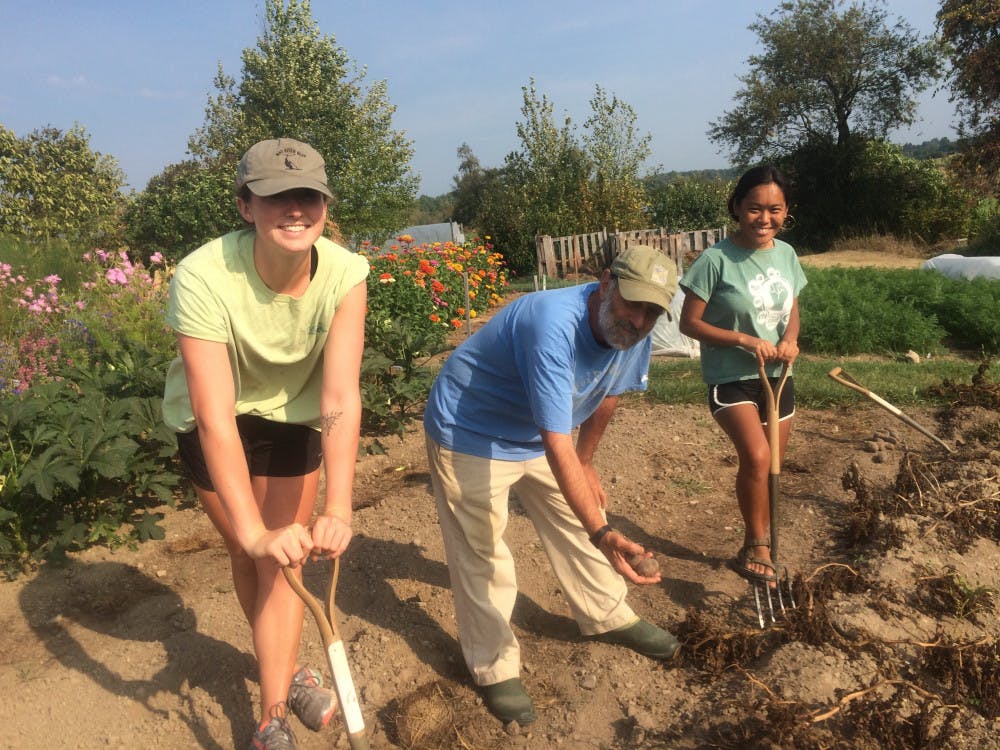Over the summer, a prospective student visiting the Middlebury College Organic Farm asked Jay Leshinsky, “So, does this place run itself?”
Leshinsky, the very tan full-time farm educator who manages the farm year-round, chuckled.
The question sounds absurd but many Middlebury students, myself included, have only spent time at the farm for sunset picnics, a couple of early morning runs, and perhaps a mid-afternoon class. For the majority of us, the upkeep of this two-acre plot is often taken for granted as a sort of neglected luxury. Yes, student volunteers work on the farm during the academic year, but what happens when the tomatoes start to ripen and the melons need weeding?
The Organic Farm was planned and envisioned by two passionate students, Bennett Konesi ’04.5 and Jean Hamilton ’04.5, in 2002. A year later, two alumni donors created a fund to hire two part-time summer interns to work the farm during the summer season. Since then, the summer internships have increased to four full-time positions. This summer, Matt Barr ’17.5, Margot Babington ’18, Jackie Kearney ’16, and Karma Lama ’17 were selected for the internship.
For the four summer interns, days begin at 8 a.m. when they spend an hour doing a morning “walk-around” to see how each crop is doing and planning their tasks and priorities for the day.
“Something like weeding or thinning [is good] if someone is looking for a meditative task,” said Kearney. “If you want to take your time and just think, you can go in a corner and weed for an hour and a half or so. It’s really nice.”
A more laborious task is watering the beds by hand. The farm’s design of many small beds encourages individuals to focus on a single crop at a time. There is no massive farm machinary here. While this design is great for educational purposes, irrigation has been a challenge.
The steady wind on the hill makes a large overhead sprinkler irrigation system inefficient. Indeed, the small irrigation system does not cover the entire farm. To irrigate individual beds, Leshinsky and the interns must lug two gallon watering cans back and forth from the fields.
The soil properties and farm location also make it difficult to keep beds moist. The Organic Farm was originally built on the hill due to the excellent draining properties of the sandy loam soil.
“The soil’s great when we have a June like we did where it rained almost every day,” Lehinsky said. “Since then, however, there’s been a dry spell. Besides an inch of rain on July 1, the farm hasn’t received much else... A lot of things are drying up but we can’t water the entire place. We have to pick and choose.”
Lehinsky said that fall crops are prioritized first, while summer crops, like tomatoes, are pretty much allowed to finish for the season.
“We’re also trying to plant cover crops, but there’s not enough rain to germinate them,” he sad. “It’s very challenging right now. It would take a prolonged slow rain to really saturate the ground.”
For summer intern Lama, an Environmental Studies major, the late summer drought forced her to address topics commonly discussed in classes, like soil erosion and water scarcity, in real-time.
“We actually experienced these is- sues in day-to-day work,” she said. “It wasn’t just something you theorized in class anymore.”
Despite the subpar weather this summer, Leshinsky is optimistic about the farm’s yield and the internship program as a valuable educational opportunity.
“In the most philosophical sense, I would say you always have to adapt your plans,” he said. “There are factors beyond your control when you’re dealing with the natural world. Of course, you plan as best you can. We have 14 years of records here about what we’ve grown, where we’ve grown it in different conditions. But you know nothing will be the same year from year, so you’re always having to be a good observer. To watch, to look, to smell.”
Around 10 a.m., Lehinsky and his in- terns break to chat and snack on freshly picked produce, varying from cucumbers to cantaloupes depending on what’s in season.
“[Tasting produce] is really, really exciting,” Kearney said. “We planted watermelons from seed in June and now we’re literally seeing our work come to fruition.”
“Seeing that full cycle has been rewarding,” Lama echoed. “The summer, that’s the peak season. Even if you volunteer out here [during the academic year], you miss that. Food also tastes ten times better coming straight out of the ground from your own hard work.”
From her summer working on the organic farm, Kearney was struck by how much water and energy was invested into producing just a small percentage of food for College Dining Services, even when using organic low-impact farming methods.
“We [at Middlebury] are in a position where we’re fortunate enough to be concerned about the quality of our food,” she said. “We talk a lot about whether it’s possible to feed everyone this way [organic and local]. I think there is a possibility but from looking into how much work goes into it and seeing small farms around here and how hard it is for them, it would take a lot.”
With the popularity of movies like Food Inc. and Jeremy Seifert’s OMG G.M.O, it’s often easy to romanticize the potential of small organic farms and their overall success.
“It’s work,” said Leshinsky. “Last summer, we spent hours and hours bent over green beans because two beds matured at the same time. But on the other hand, I feel pretty lucky that I can be out here all summer with wonderful students and great conversations.”
Spending Summer on the Organic Farm: Students Challenged by Recent Drought

Comments


